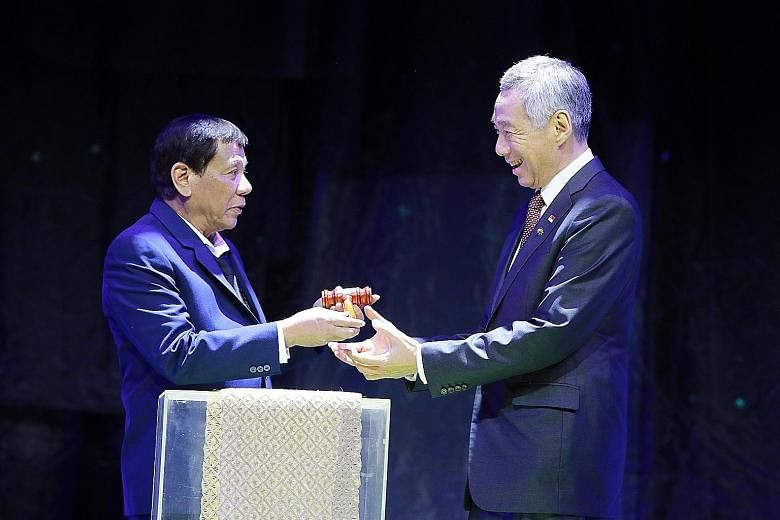Leaders of countries discussing a mega free trade deal said at a meeting yesterday that for negotiations to succeed, members' expectations had to be adjusted.
The Asean-led Regional Comprehensive Economic Partnership (RCEP) includes Australia, China, India, Japan, South Korea and New Zealand. But its conclusion has been delayed repeatedly.
Observers hope that the recent revival of the Trans-Pacific Partnership (TPP) over the weekend, in the form of the Comprehensive and Progressive Agreement for the TPP, will give RCEP talks a nudge.
The two pacts are sometimes seen as rivals, even though seven TPP members are also in the RCEP, and leaders have described both initiatives as building blocks towards a wider Asia-Pacific free trade area.
Yesterday's RCEP Summit in Manila was the first sit-down meeting between leaders of all 16 countries in the trade deal since the launch of negotiations in November 2012, Singapore's Prime Minister Lee Hsien Loong noted.
He thanked Indonesia for its leadership role over the pact - the country has been coordinating RCEP talks - adding that all nations have worked hard to make progress.
"Nevertheless, negotiations have taken longer than expected," he said, noting members had missed three deadlines for conclusion.
This is the RCEP's fifth year of negotiations since its launch in 2012. The deal was targeted to have been concluded in 2015. This was pushed back to 2016 and then to this year.
Substantial work still needs to be done and the challenges are complex, said PM Lee in a frank assessment of the difficulties lying ahead.
As Asean chair next year, Singapore is "committed to exercise maximum efforts to push negotiations forward", he said.
Opening the summit, Philippine President Rodrigo Duterte noted the RCEP represented almost half the world's population and over a third of global economic output. "It is not simply another trade agreement but a trade agreement that could provide the size and scale to unleash new growth potentials and write the new rules of the game of the international trade order," he said. "But rewriting the global economic landscape requires us to urgently bring the negotiations to a close, and to create deeper trade linkages that would demonstrate our commitment to free and open markets."
PM Lee said there was a need to balance the sensitivities and political constraints of each RCEP party. "We have to find common landing zones... We need renewed mandates to recalibrate the level of ambition to realistic levels."
He also urged parties to engage with one another in good faith in a frank and open manner.
Creative solutions are needed, such as addressing sensitivities in smaller groups if needed, he said.
A high-quality and comprehensive RCEP, he said, will tangibly benefit businesses and people and "show the world that the region is confident in our economic future".
South Korean Trade Minister Kim Hyun Chong asked each and every country to exercise flexibility while pushing for a comprehensive and high-level deal, said South Korea's Yonhap news agency.
Earlier in the day, Chinese Premier Li Keqiang, Japanese PM Shinzo Abe and South Korean President Moon Jae In urged fellow regional leaders at the Asean Plus Three summit to stay the course on economic and regional integration.
PM Lee pointed to the potential synergy between Asean's master plan to improve connectivity and efforts like China's Belt and Road Initiative, Japan's Expanded Partnership for Quality Infrastructure and South Korea's Asean Connectivity Forum. Peace and stability are key for these to succeed, he said, adding: "Regional security is the cornerstone of our growth and development."

